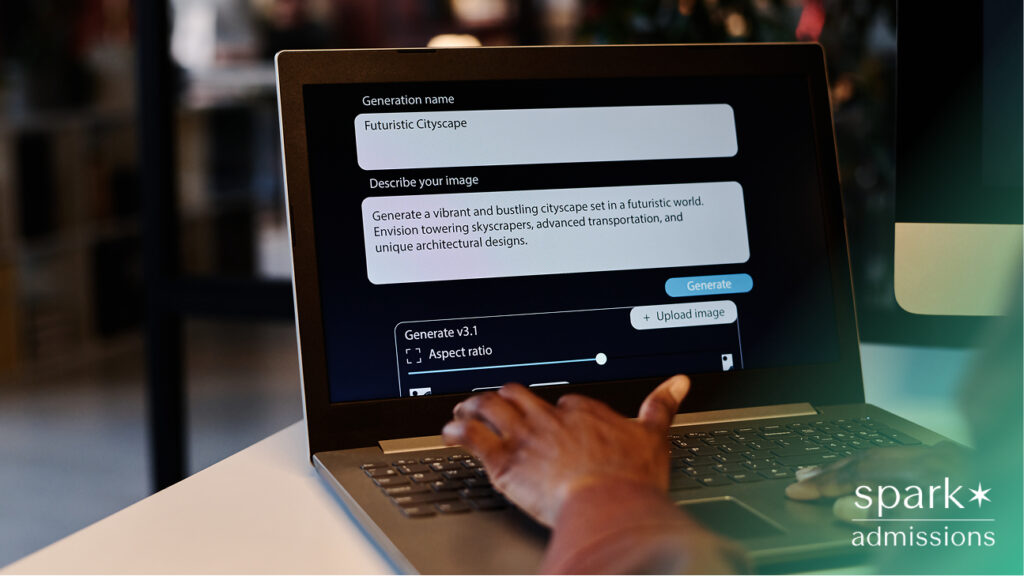
Given the growing potential of AI to shape applications, admissions offices have adopted a range of detection methods. They use online AI detection tools, with some schools experimenting with proprietary systems tailored to application essays.
These detection technologies analyze linguistic patterns, vocabulary, and sentence structure to spot text that may not reflect a student’s natural writing process. They also produce AI detection results with probability scores indicating whether an essay is likely to be machine-generated.
Yet, technology is far from perfect. False positives remain a significant concern, especially for non-native English speakers whose writing style may appear overly formulaic or inconsistent. This risk raises serious questions about equal opportunity and whether all students are judged fairly in the college application process.
For this reason, most schools treat detection software as one piece of a larger system rather than as a final verdict.

Policies on AI Use in Applications
One of the most pressing questions students face is whether colleges allow any form of AI in the application process. The answer depends heavily on the institution. Some universities have already established strict rules, while others are still figuring out their approach.
Several elite schools, including Brown University and Georgetown, have issued policies explicitly banning AI-generated content in admissions essays. Their stance is clear: any applicant who submits an essay written, in whole or in part, by AI is violating academic integrity standards.
Other institutions, such as Caltech, Cornell, and the University of California system, have taken a more nuanced approach. They allow applicants to use AI tools for limited purposes, such as checking grammar or clarifying sentence structure, but make it clear that the substance of the essay must come directly from the student.
A recent review of the Top 30 U.S. universities revealed a striking inconsistency: about 70% of schools have no formal AI policy, 7% prohibit AI use completely, and roughly 27% allow restricted use, usually for brainstorming or editing but not drafting. This patchwork reflects both the speed of technological change and the difficulty of balancing innovation with integrity.
For students, this means there is no universal rulebook. Instead, applicants must carefully review each institution’s stated policies and adhere to the standards of honesty and originality that underpin the admissions process.
A Combination of AI Detection Methods
As mentioned before, essays go through multiple hands to determine if AI was heavily involved or not.
AI Detection Tools
Given the potential for students to rely heavily on AI, admissions offices have turned to detection software to identify suspicious writing. Tools like Turnitin, GPTZero, Originality.ai, Copyleaks, and ZeroGPT are among the most widely used in higher education. Some of these platforms claim to distinguish AI-generated content with impressive accuracy, but their reliability varies.
Research suggests that Originality.ai has one of the highest detection rates, while others, including Turnitin’s AI detection tool, have been criticized for generating false positives. This is particularly concerning for non-native English speakers, whose unique writing styles may be unfairly flagged as AI-generated.
As a result, detection software is rarely used in isolation. Admissions officers recognize that AI detection tools are fallible, so flagged essays typically receive additional human scrutiny. Officers compare the style of the essay with other writing samples, such as short-answer responses, recommendation letters, or even in-person interview notes. Consistency remains one of the strongest indicators of authenticity.
Human Oversight
Even as AI detection tools improve, human oversight remains essential. Experienced college admissions officers look for qualities algorithms cannot measure: nuance, vulnerability, and the personal detail that defines authentic writing.
When essays are flagged, committees often implement additional verification steps. Officers may compare an applicant’s personal statement with other application components, such as short-answer responses or recommendation letters. In some cases, they consult high school counselors to confirm whether the essay aligns with a student’s demonstrated abilities.
If suspicions remain, schools may request additional writing samples or conduct interviews where applicants must discuss their essays in detail. These steps ensure fairness and reduce the risk of unfairly penalizing a student based on flawed AI detection results.
Institutional Strategies to Preserve Authenticity
Beyond detection, some colleges are rethinking the role of essays altogether. Duke University, for instance, has recently reduced the weight given to essay ratings and standardized test scores, citing the growing prevalence of AI. This shift underscores the possibility that colleges may eventually design applications that are less vulnerable to outside assistance and more focused on real-time, verifiable demonstrations of student ability.
Other institutions rely on long-standing honor codes as a safeguard. Stanford, Harvard, and MIT have not introduced detailed AI-specific rules, but their codes of conduct already prohibit misrepresentation. For these schools, using AI to write an essay is seen as a violation of academic honesty, whether explicitly mentioned or not.

Common Myths and Effective Strategies for College Essays
For prospective students, the confusion around AI has fueled several myths. One is that admissions officers cannot detect AI-generated work. While detection is imperfect, seasoned readers are adept at identifying writing that lacks the depth, reflection, and specificity of human storytelling.
Another myth is that even minimal use of AI for brainstorming is considered cheating. In reality, many colleges accept limited support during the writing process as long as the student produces authentic writing that reflects their own experiences.
A final myth is that AI will produce stronger essays than students can. In practice, AI writing tools often generate polished but generic prose. What admissions offices value most is individuality. Applicants should focus on weaving personal stories into their application essays and ensuring consistency across their application components.
Effective strategies include journaling before writing, drafting multiple versions, and asking teachers or high school counselors for feedback. Students should also prepare for interviews or short writing tasks that test whether their own work matches the voice in their submitted essays.
Common Red Flags for AI in College Essays
Several characteristics consistently trigger closer examination by admissions teams. AI-generated essays containing predominantly generic examples without specific personal details raise immediate concerns, as authentic writing typically includes unique contextual elements that are difficult for AI to fabricate. AI-generated essays often read as impersonal or flat as a result.
Content with perfectly structured writing lacking the natural variations typical in human composition often warrants additional scrutiny, as well. College admissions officers note when vocabulary and sentence complexity appear inconsistent with an applicant’s background or previous academic work. Responses that address prompts with mechanical precision rather than personal interpretation frequently raise questions about authenticity.
The absence of genuine reflection or emotional depth when discussing significant experiences serves as another common indicator of potential AI involvement. Moreover, an inconsistent voice or writing style across different application components can reveal when certain sections were written by different authors—human or artificial.
Admissions officers have become increasingly skilled at distinguishing between acceptable AI assistance, such as grammar checking or organizational help, and inappropriate substitution of AI-generated content for authentic personal expression. Their primary concern is identifying instances where applicants misrepresent machine-generated work as their own original writing rather than penalizing the thoughtful use of technology as a learning tool.
Broader Industry Perspectives on AI
The debate over AI in admissions extends beyond individual institutions. Educators, policymakers, and industry leaders are grappling with the ethical and practical implications of these technologies. Some argue that AI can democratize access to higher education by helping students who lack strong support systems to brainstorm or structure their essays. Others warn that it risks exacerbating inequalities if wealthier students have access to more advanced AI tools or coaching on how to evade detection.
There is also a growing call for AI literacy. Rather than treating AI solely as a threat, some educators advocate teaching students how to use these tools responsibly. This includes understanding their limitations, practicing critical thinking, and maintaining a commitment to originality. As one researcher noted, admissions may need to evolve not just by banning AI, but by reimagining what authentic assessment looks like in a digital age.
Leave AI Out of It
The potential of AI in admissions has brought new complexity, but the mission of admissions offices has not changed. Colleges aim to identify students who will thrive in their communities. With evolving detection methods, clearer institutional policies, and thoughtful human oversight, colleges are working to protect both fairness and integrity in the process.
For students, the message is simple: embrace your individuality, produce your own essays, and resist the temptation to let machines replace your voice. Genuine storytelling remains the most powerful tool in the college admissions process!
At Spark Admissions, we help students navigate these challenges with expert guidance at every step of the application process. From refining your writing process to ensuring your application materials reflect your authentic self, we provide the strategies and support that you need to stand out for the right reasons. Schedule a consultation today to prepare your strongest, most genuine application.


